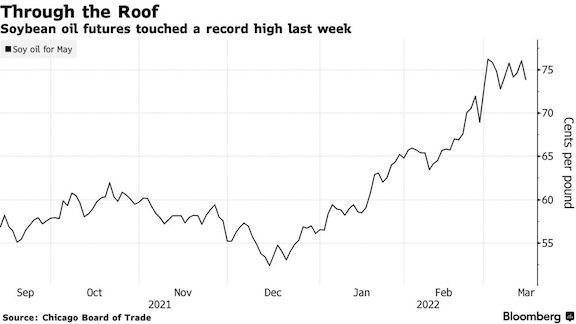Argentina has blocked agriculture traders from registering cargoes of soybean meal and oil for export, a move it usually makes before hiking taxes on shipments, amid expectations that the government will seek to tap the global rally in crops.
Argentina is the biggest exporter of soy meal for livestock feed and soy oil for cooking and biofuels. Farmers in the South American nation start harvesting beans at the end of the month, with the bulk of fieldwork done in April and May. Ukraine is a top global supplier of a competing oil made from sunflowers.
Crop export taxes provide an important—and often controversial—revenue stream for Argentina’s government, which is trying to push through a new economic plan backed by the International Monetary Fund. The government tends to close the export register before a tax hike to stop farmers from preempting and circumventing the increase with a flood of sales.

Soy meal and oil are currently taxed 31%, but speculation has been circling trading desks that the rate will rise to 33%. If that happens, the government stands to make an extra $400 million from the upcoming harvest, Lorena D’Angelo, a crop market analyst in Rosario, said in a tweet.
Argentina’s main farm groups lambasted the talk of a tax hike, saying in a statement that the agriculture industry can’t operate properly with unpredictable parameters.
Soy processors had bought and priced 2.2 million metric tons from farmers via forward contracts through March 2, according to government data, with none of that volume registered for export. Argentina is forecast to export 28 million tons of soy meal and 5.9m tons of soy oil this season, according to the U.S. Department of Agriculture.
Argentina had already intervened in crop markets since the start of the Russia-Ukraine war with a subsidy for the domestic wheat industry, mirroring an earlier policy for vegetable oils, as food protectionism picks up worldwide.
Fuel Hike
The global commodities rally hit home for Argentina in a second way on Monday as state-run oil driller and refiner YPF SA hiked prices at the pump by about 10% to cover the soaring cost of diesel imports.
YPF’s drilling plans in shale patch Vaca Muerta depend on fuel sales. But the company also accounts for more than half of Argentina’s gasoline and diesel consumption, so the increase will likely be a blow to efforts to slow inflation.







